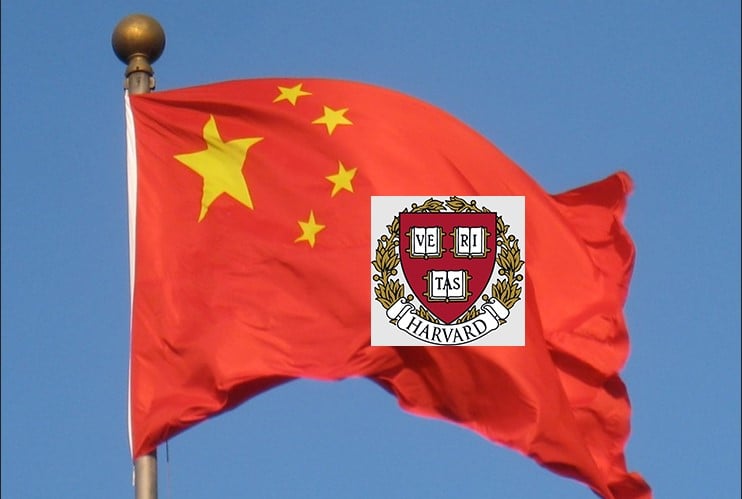The question posed in the title of this essay may sound flippant, but it is sincere. Over the years, Harvard has accepted massive amounts of funding from China. The Harvard China Fund finances research, teaching, and academic exchange. The Fairbank Center for Chinese Studies offers grants for China-related activities. The influence runs deep, subtly shaping curriculum, discourse, and research priorities. Then there’s the Harvard-Yenching Institute (HYI), which collaborates with Fudan University, one of China’s top institutions, on research and academic exchanges. Fudan, however, has strong connections to the Chinese Communist Party (CCP), which, a few years ago, reinforced its control over the university by revising its charter to highlight party loyalty.
Harvard isn’t the only one sleeping with the enemy. According to a new report from Americans for Public Trust, U.S. universities have taken in $60 billion in foreign gifts and contracts in recent years. A staggering $20 billion of that total has flowed into elite institutions like MIT, Stanford, and Yale. Nearly $800 million has come from countries openly hostile to the United States. These include Russia, Venezuela, Yemen, and, of course, China.
In other words, the very nations that hack U.S. government databases, undermine elections, and flood digital spaces with propaganda are investing hundreds of millions into the institutions that shape America’s future leaders and conduct cutting-edge research. It may seem obvious, but it needs to be stated: this is an influence operation disguised as philanthropy. It represents the slow, patient process of bending American institutions to the will of its adversaries.
And it’s working.
Some of these methods are painfully obvious. China, for instance, has spent years cultivating relationships within academia. The CCP is known for many things, but altruistic benevolence is not one of them. Beijing doesn’t simply hand out money without expecting something in return; it embeds itself in research programs, funds “cultural exchange” initiatives, and fills university boards with individuals sympathetic to its interests. The result is as obvious as it is concerning. American professors censor themselves when criticizing China. Entire departments focus on narratives approved by Beijing. Research that threatens China’s economic or military ambitions vanishes, quietly set aside by administrators concerned about losing funding.
Then there are the more insidious tactics. Foreign governments are buying access to some of the brightest minds in the country, along with their research findings. Contracts associated with research programs allow adversaries to legally obtain sensitive information. Many of the universities receiving these funds engage in research with national security implications—artificial intelligence, quantum computing, and biotechnology. While American taxpayers foot the bill for government research grants, foreign entities exploit loopholes to extract the findings. The U.S. spends billions on defense research and development, and China walks away with the blueprints for free. And then there’s the ideological battlefield. China funds Confucius Institutes on university campuses that whitewash that regime’s abuse of its population. Gulf states pour money into programs that present radical interpretations of Islam as mainstream. Russian-backed entities push narratives aimed at fostering domestic division in the United States.
A point that really needs emphasis is the fact that universities aren’t just passive recipients of this money. Many are willing partners. They accept the funds, ignore disclosure requirements, and actively conceal the sources of their foreign donations. Over the years, investigations have consistently found that elite institutions have failed to report billions in foreign funding, with some intentionally circumventing transparency laws. One doesn’t need a Ph.D. from Harvard to understand why. It’s rather simple. The money is too good to pass up. American universities—bloated with administrators and drowning in bureaucracy—are like junkies. Their drug of choice is cold, hard cash. Foreign autocrats recognize and exploit this. Duke will gladly take millions from China while turning a blind eye to the thousands of Uyghurs imprisoned in concentration camps. Yale will pocket money from Russian oligarchs while simultaneously virtue-signaling about “threats to democracy.” The hypocrisy would be laughable if it weren’t so downright dangerous.
Now is the time for the Trump administration to take this threat seriously. This isn’t just an academic issue. It is, I suggest, a direct national security threat, far more dangerous than DEI. A university system compromised by foreign money actively undermines the nation’s sovereignty. It infiltrates critical research fields, distorting public discourse while funneling research findings into the hands of adversaries. Again, it might sound obvious, but it needs to be stated: CCP-linked funding has little, if anything, to do with cultural exchange. It has, however, got plenty to do with strategic subversion. This silent takeover will leave the U.S. trailing in science, technology, and military innovation if left unchecked.
Any university caught hiding foreign funds should face swift financial penalties, loss of federal research grants, and public scrutiny. No more funding for research in AI, cybersecurity, or military-related activities influenced by China, Russia, or Islamic extremists. If a university seeks federal grants, it should be prohibited from accepting funds from nations that would love nothing more than to see the U.S. brought to its knees. Universities that take foreign money for ideological programming should be required to disclose it publicly. If administrators are complicit in hiding foreign influence, they must be held accountable. This represents corruption at the highest levels of academia and deserves appropriate punishment.
The Biden administration did nothing to address this issue. President Trump has an opportunity to make a significant, meaningful impact that is long overdue. U.S. universities remain wide open for foreign exploitation. That cannot continue. The current administration must make one thing clear: American institutions are no longer for sale.

Leave a Reply